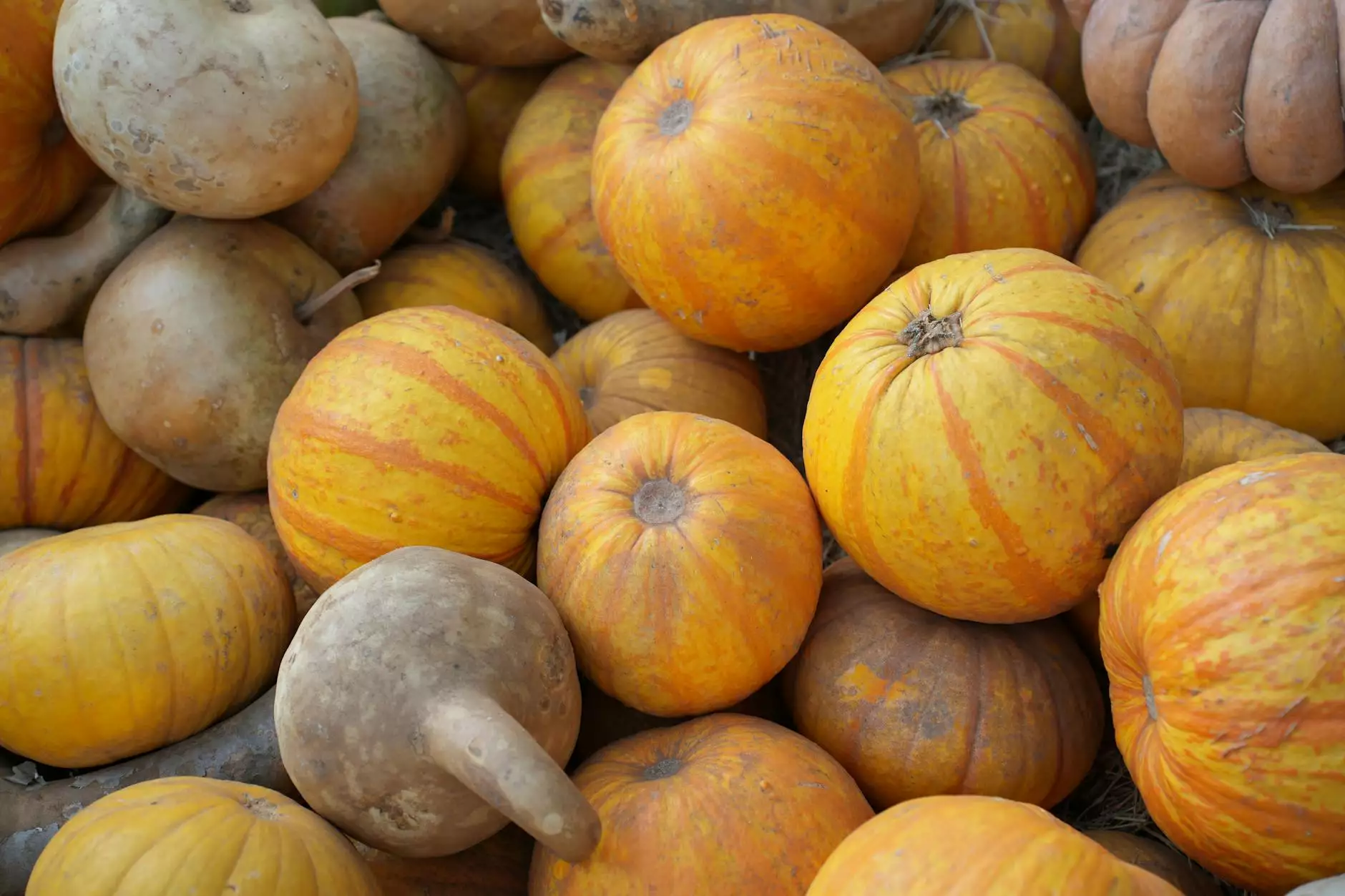Discover the World of Pumpkins with pumpkins.co.uk

When it comes to gardening, one of the most versatile and delightful plants you can grow is the pumpkin. At pumpkins.co.uk, we are passionate about pumpkins and their myriad uses, from culinary delights to aesthetic decorations. In this article, we explore everything you need to know about pumpkins, ensuring you can grow, harvest, and enjoy them to their fullest potential.
The Origins of Pumpkins
Pumpkins have a rich historical background that dates back thousands of years. Native to North America, they were cultivated by Indigenous peoples long before European settlers arrived. Pumpkins belong to the Cucurbitaceae family, which also includes squash, cucumbers, and melons.
Over time, they have become a staple in various cultures around the world. Whether carved into jack-o'-lanterns for Halloween festivities or used in seasonal recipes, pumpkins hold a special place in both tradition and modern life.
Growing Pumpkins: A Gardener's Guide
Growing pumpkins can be a rewarding venture, whether you have a sprawling garden or a small allotment. Follow these essential tips to ensure a bountiful pumpkin harvest:
- Choosing the Right Variety: There are many types of pumpkins, including carving pumpkins, sugar pumpkins, and ornamental varieties. Choose a type that fits your purpose.
- Soil Preparation: Pumpkins thrive in rich, well-drained soil. Before planting, amend your soil with compost to provide the necessary nutrients.
- Location and Sunlight: Pumpkins require full sun, meaning they need at least six hours of direct sunlight each day. Choose a sunny spot in your garden.
- Planting: Plant seeds after the last frost date, typically in late spring. Sow seeds 1-2 inches deep and space them 2-3 feet apart for optimal growth.
- Watering: Pumpkins need plenty of water, especially during dry spells. Aim to keep the soil consistently moist but not waterlogged.
- Pest Management: Keep an eye out for common pests such as aphids and squash bugs. Natural pesticides and companion planting can help ward off infestations.
Harvesting Your Pumpkins
Knowing when to harvest your pumpkins can significantly impact their taste and texture. Here are some signs that your pumpkins are ready for harvest:
- Sound Test: Knock on the pumpkin; a hollow sound indicates it is ripe.
- Color: The pumpkin should have a deep, uniform colour. Varieties will vary, but generally, pumpkins should have vibrant hues.
- Stem Condition: The stem should be firm and brown, showing that the pumpkin has matured.
- Skin Hardness: A mature pumpkin will have a tough skin that resists punctures from your fingernail.
Using Pumpkins: Culinary and Creative Ideas
The uses of pumpkins extend beyond just decoration. Here are some ways to incorporate pumpkins into your life:
Culinary Delights
Pumpkins are incredibly versatile in the kitchen. Here are a few favourite recipes to try:
- Pumpkin Soup: A comforting and creamy delight, perfect for chilly evenings.
- Roasted Pumpkin Seeds: After carving, don't waste the seeds. Toss them with oil and salt, roast them for a crunchy snack.
- Pumpkin Pie: A classic dessert that has become synonymous with autumn celebrations.
- Pumpkin Bread: A moist and flavourful bread that showcases the earthy sweetness of pumpkins.
Creative Uses
Pumpkins are also a fantastic medium for creativity:
- Jack-o'-Lanterns: Carving pumpkins into jack-o'-lanterns is a beloved tradition during Halloween.
- Autumn Decor: Use pumpkins of various sizes and colours to decorate your home for the fall season.
- Compost: If you have leftover pumpkins, composting them returns nutrients to the soil.
Health Benefits of Pumpkins
Not only are pumpkins delicious and beautiful, but they also offer numerous health benefits:
- Rich in Nutrients: Pumpkins are packed with vitamins A, C, and E, as well as antioxidants that can help boost the immune system.
- High in Fibre: The high fibre content promotes healthy digestion and can aid in weight management.
- Heart Health: Pumpkins contain potassium, which is essential for heart health, as well as compounds that may reduce blood pressure.
The Environmental Impact of Pumpkin Cultivation
As more individuals turn to sustainable practices, growing pumpkins can also be an eco-friendly choice:
- Low Water Requirement: Once established, pumpkins require relatively low amounts of water compared to other crops.
- Soil Health: Growing pumpkins can enrich the soil with organic matter, especially if you use crop rotation techniques.
- Wildlife Friendly: Pumpkins attract beneficial insects and provide food for birds and other wildlife.
Conclusion
At pumpkins.co.uk, we believe that pumpkins are a treasure of the gardening world. From growing and harvesting to enjoying them in various forms, the appeal of pumpkins is undeniable. Embrace the joy of gardening and the satisfaction of harvesting your own pumpkins this season. Whether you are an experienced gardener or a novice, there is always something new to learn and enjoy about pumpkins.
Join our community at pumpkins.co.uk to share your experiences, recipes, and gardening tips. Together, we can cultivate our passion for pumpkins and all they bring to our lives!









